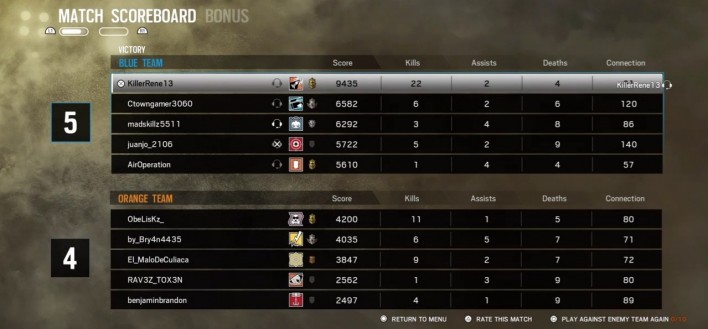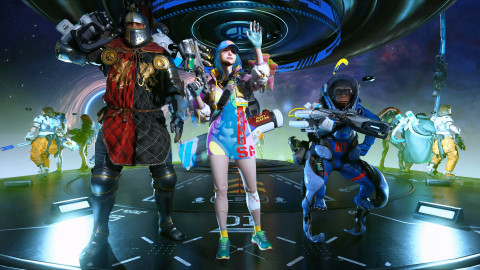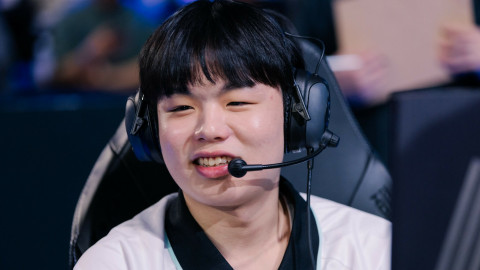
“We designed Overwatch from the ground up to excel as a competitive game,” said Mike Morhaime, then-president of Blizzard Entertainment, at BlizzCon 2016. From the main stage at the Opening Ceremony, he lauded Overwatch's competitive spirit and Blizzard's dedication to esports, and then revealed the year's main attraction: the Overwatch League.
In the two years since, the inaugural season of the League has come and gone, and Overwatch has become a behemoth in the esports landscape, its success with a traditional league format spawning copy-cats in a number of other titles. The game recently won Esports Title of the Year, Esports Event of the Year (for the Grand Finals), and Esports Publisher of the Year (for Blizzard) at the Esports Awards, and the Overwatch League’s second season has expanded by eight whole teams.
But despite its on-paper success as an esport, the assertion that Overwatch has been built from the ground up to excel as a competitive game is misguided at best and deluded at worst. There are any number of issues to point out here, from Overwatch’s slew of out-of-place, dizzyingly imbalanced heroes to the persistent lack of solo and role queues to coin tosses and tied maps to developers once thinking that no hero limit was a good idea.
But on a fundamental level, nothing is more indicative of Overwatch’s resistance to competitive gameplay than its continued lack of a scoreboard.

To lay some groundwork, scoreboards* in competitive games display player performance stats for everyone in the server to see. Scoreboards always include basic information such as kills and deaths, but most games also add title-specific stats, such as money in Counter-Strike: Global Offensive and acceleration in Quake.
Scoreboards are a staple of competitive FPS games and Team Fortress 2, the game that Overwatch is blatantly modeled after, is no exception. Yet, a scoreboard is another one of those not-so-little things that Blizzard chose to omit from their take on the hero-based shooter.
Lead game designer Jeff Kaplan explained the decision in 2016, saying, “The scoreboard that a lot of players want is what I call the spreadsheet -- it's just rows and columns of everything and they're like, ‘Let us figure it out.’ But that feels like a give-up moment to us. We want players to be able to look at the scoreboard and go, ‘I know who's performing really well, and I know who's not.’ If we just make it about kills and deaths, it doesn't tell the complete story of who's doing well and who's doing not.”
"...in order to fix problems, players first need to be able to
identify problems but without a scoreboard, they have only a
blind, narrow focus on their own uncontextualized statistics,"
He elaborated to say that Mercy’s role, for example, is not adequately represented in a kill-death scoreboard because she is a noncombatant healer, and added that the team considered a scoreboard focused on objective time and objective kills but that that, too, failed to sufficiently summarize teammates’ performances.
“We basically stopped displaying any form of scores, kills, deaths because it really wasn't telling the story of who was doing their job properly to win or lose as a team,” Kaplan said. “And really, what it's all about is, ‘Did you win or lose as a team?’ None of that other stuff really matters at the end of the day.”

Except… “that other stuff” really does matter at the end of the day. On an ideological level, there is no notion more at odds with the spirit of competition than 'knowing exactly how well you performed doesn't matter,' but on a practical level, team statistics are vital for understanding if and how and to what extent you won or lost as a team in Overwatch.
A victory screen can tell you that, yes, you won the game and a gold medal can tell you that you contributed to the most kills, but that information lacks the context needed first to understand the match itself, and then to analyze and improve one’s own play. For example, 15 kills and 3 deaths in a round can mean that you absolutely carried as an individual or it can mean that your whole team steamrolled your opponents or it can mean something in between -- it all depends on how many kills and deaths your teammates had in comparison.
Gameplay assessments become even more nuanced when stats like damage done, healing done, assists, healing received, etc. are considered. Kaplan is right in saying that a Mercy's contribution is not adequately reflected in kills, but her deaths, healing output, and assists can provide invaluable insight when compared to her team's.
Thus, it is because Overwatch is a team effort that knowing how an individual's performance stacks up against their group's is so necessary. The story of a game and the path to self-improvement can suddenly become illuminated when context is provided via the simplest of data.

Context can tell players whether they need to play safer or be more aggressive; if their Zenyatta needs more support or if their Ana has mistaken herself for a DPS; if their Reinhardt is shielding often or if their Winston is eating too much damage, and so on. Concisely, in order to fix problems, players first need to be able to identify problems, but without a scoreboard, they have only a blind, narrow focus on their own uncontextualized statistics.
And that lacking perspective can lead to a host of negative outcomes, perhaps chief among them being enhanced feelings of helplessness and frustration. It is no secret that ranked Overwatch can often make players feel exceptionally powerless and, in turn, angry, and while those feelings undoubtedly stem from the title’s team-reliant gameplay, they are exacerbated by a persistent, intentional lack of information.
"By robbing players of these most basic of tools, Overwatch has
offered its players only the shell of a ranked system
and created a warped, self-absorbed competitive ecosystem,"
Players are left guessing at their teams’ issues because they are deprived of the basic stats necessary to evaluate gameplay -- and not only are their guesses often wrong, but when they are right, players have no data to support their conclusions, nor to convince others of their legitimacy.
Overwatch's no scoreboard policy, then, can and does breed excessive frustration and helplessness; exceedingly petty, unresolvable "he said, she said" arguments; and, virulent hero intolerance, all of which contribute significantly to Overwatch's ever-present toxicity issues and players' general dissatisfaction with the game.
"The State of Overwatch" has accrued over 1.3 million views and an 89k-3k like-dislike ratio.
Brandon "Seagull" Larned touched on the issue in his "The State of Overwatch" video, saying, "I don’t know if they’re performing well [on the off-meta hero] or not, but I know typically they wouldn’t, and it’s not like I have access to a scoreboard to see if they are performing well, so of course … they could be performing well and I’m probably going to blame them if we start losing."
Lacking the data necessary for tangible improvement, games become a blur of indistinguishable wins and losses, meaningless in that they lack the context necessary for players to effect change mid-game and to self-assess post-game.
The ability to analyze and reflect on one’s gameplay is essential to any competitive title, freely offered to players in other games through scoreboards and replays. By robbing players of these most basic of tools, Overwatch has offered its players only the shell of a ranked system and created a warped, self-absorbed competitive ecosystem.

Beyond empowering players with the basic information they need to evaluate and improve their performance, scoreboards can facilitate players’ recognition of their teammates’ excellence, something Blizzard has tried time and time again to foster through various social features. Endorsements, medals, Plays of the Game, “fire,” and end-game playing cards are all transparent, well-meaning attempts to encourage niceties between gamers, but they have all failed to have meaningful impact for one reason or another.
Endorsements, for example, are given indiscriminately and lack the context to make them meaningful. Play of the Game is awarded to only one of twelve people and the algorithm routinely fails players, choosing to show insignificant plays or, more often than not, Ultimate kills that struggle to impress.
When they are not skipped completely, end-game playing cards are ignored and, again, lack the context to make them meaningful. And as for being “on fire"? Well… sorry Blizzard, but nobody has ever, ever cared.
"...players are locked inside their own data bubbles, steadily
becoming self-absorbed and hostile because they can only
see the few strokes they paint rather than the whole picture,"
Besides, most of these features come into play after the game when everyone has already gotten into arguments or fled as soon as possible. They have little affect on the atmosphere mid-game, but something as simple as a scoreboard -- a quick, easy, ever-present snapshot of your teammates’ performance -- could empower players to see value in their teammates; to recognize others' contributions as well as their own and to feel less like they are playing solo games simultaneously.
Call it silly or chock it all up to ego, but players want to be recognized for their gameplay. For example, ranked games can often go south despite a player’s feeling like they have performed well, and sometimes the difference between leaving such games angry, disgruntled, or self-satisfied is someone simply acknowledging your contribution.
It feels good when someone compliments your healing and we feel proud when others are impressed by our kills, but those moments will remain far and few between if players are not even given the information they need to be impressed.

The elephant in the room, of course, is toxicity. In 2016, Kaplan denied that preventing toxicity was the development team's reasoning for excluding a scoreboard, but he did say that there were "some valid arguments ... made in terms of toxicity" and over the last few years, the competitive community has latched onto that justification.
The reality is that, yes, a scoreboard would likely give jerks a tool with which to be mean, but it is an unfortunate fact of life (and of competitive games) that some people just suck and, as we have experienced, a scoreboard's exclusion has done nothing to curb toxicity in Overwatch.
People are going to be jerks regardless, but that is no reason to deny the wider playerbase the tools they need to assess and improve their gameplay, which is the fundamental goal of any competitive player. The pros here far outweigh the cons.

For over two years, players have been locked inside their own data bubbles, steadily becoming self-absorbed and hostile because they can only see the few strokes they paint rather than the whole picture. Developers are hesitant to show players that whole picture on the grounds that it may not be perfect, that it may not capture every last nuance and aspect of their complex game, but in their hesitance, they have failed to provide a sufficient alternative to the assessment tools that are the foundation of every competitive ecosystem.
Instead, a void of information has been created and it has contributed significantly to players' widespread despondence and frustration. It has helped to cultivate a culture of hero intolerance and hastily assigned, ill-supported blame, and when combined with the inherent friction of team games, Blizzard's choice to blind its players has made Overwatch one of the most horrid, least satisfying ranked experiences in gaming.
A scoreboard will not be Overwatch's panacea and it does not have to be, but it is a key, vital step towards making Overwatch the properly competitive game so many -- Mike Morhaime included -- ostensibly dreamed it would be.

*It is worth noting, perhaps, that scoreboards sometimes offer a cumulative "score" based on players' performance stats (hence the name). Overwatch reportedly tried this in beta but, as one Reddit user put it at the time, the score was "an arbitrary number and some characters will always score higher than others."
The type of scoreboard argued for in this column, should it not be apparent, is a simple spreadsheet style relying important data such as kills, deaths, healing done, damage done, healing received, etc..
Numerous Blizzard games already offer such a scoresheet.
Sort by:
Comments :2
-
1

level 1 vbiehr_311
level 1 vbiehr_311 1 sec ago
A problematic community only gets worse when you add a scoreboard. All you do is add one more insult people can throw at you when you under perform. Overwatch is still a very new game in the long-run, where it thrives.I believe Blizzard's plan to roll out more heroes is going to change the meta and even out hero strength more than it has. Not to mention the possibility of future graphical updates.
And when no-limit was a thing, so was OP Shield-Bastion, 3 Healers, and just Reinheart for shield. No limit made sense before blizzard introduced the somewhat controversial insta-lock. Like Fortnite and building, team comps were not a thing.
I hate to say it as a long time fan, Counter Strike may never be consistently popular again. I mean except during events and tourneys. -
0

level 1 LeineX_FlexGod
The scoreboard is utterly useless in overwatch. In a game where each character has unique skills that can complete overturn the tides of the game with specific combinations and timing, how are you supposed to compute that as a statistic?
The scoreboard in the end is only a collection of numbers that does not always equate to "doing well"
A simple example of having good teamwork is so different when comparing overwatch with another E-sport powerhouse, CSGO. In the end, CSGO comes down to which player has the best aim and game sense. Thus, the scoreboard accurately shows the "performance" of player.
In Overwatch however, there's so many aspects that cannot be shown as simple numbers. For example the Brigette Reinhardt Stun combo, if this was done right, even a player with aimbot can still lose to a team that has synergy and better game sense.
How do you plan to show the "performance" of the player with better game sense? A tank player with a lot of damaged blocked doesn't equal to him performing well as he could've been wasting precious resource before the fight even starts.






